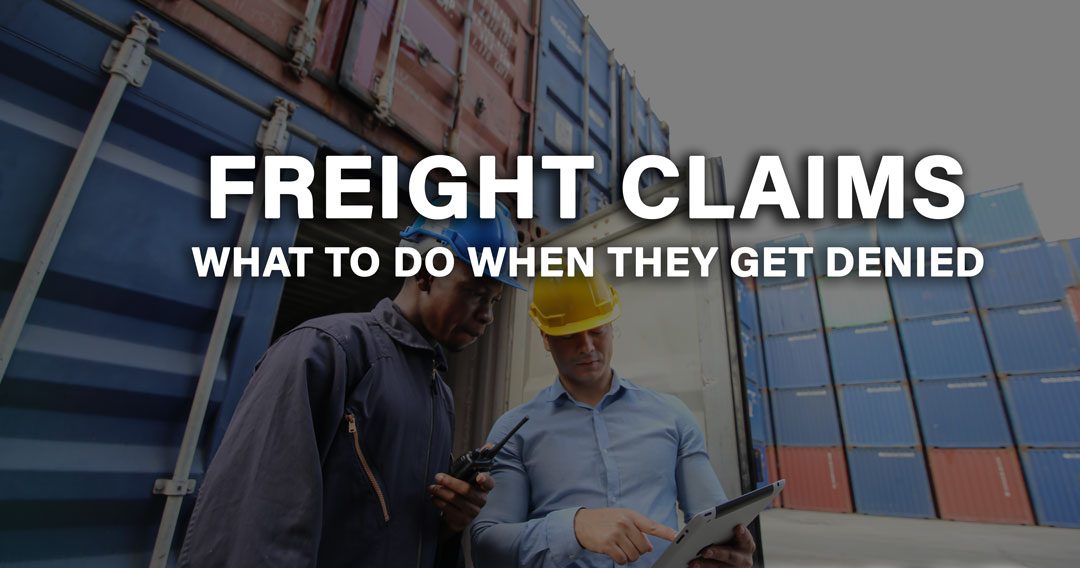What to Do When Your Freight Claim is Denied
Was your freight claim denied? Damage happens and dealing with the ramifications can be frustrating. When there is damage, it is the claimant’s job to prove that the carrier violated the agreement to deliver undamaged freight. (The carrier does not have to prove “they didn’t do it.”)
The claimant has to make the case the carrier is responsible under the rules as written in the Bill of Lading (contract). Filing a claim on the carrier requires understanding and complying with the terms outlined in the BOL – which means also understanding the national regulations and any tariff limitations. This is why having a knowledgeable 3PL like Customodal on your side to guide and assist you through the process is invaluable.
There are rules involved with freight claims and understanding them is key to getting reimbursed. Even if you do everything right, a carrier can still deny your freight claim. This leads to a whole other process involving more paperwork and even lawsuits. It’s frustrating and time-consuming if you try to do it alone!
Filing a Freight Claim can be an annoying process, so having a logistics partner with experience filing freight claims can make a big difference. At Customodal, we deal with freight claims on a regular basis and can help you with any paperwork involved.
(More on freight claims here.)
Freight Insurance vs Liability Insurance
The two sound a lot alike to the uninformed ear, but they are very different, and we need to look at each individually to get a real feel for what is covered and by whom.
Liability Insurance
If you’re a carrier or a logistics person, you already know what liability insurance is. If not, prepare for a tutorial.
Liability insurance is purchased by the carrier. It covers, to a limited degree, the liability they face in the event of a successful cargo or freight claim. Coverage is determined by the carrier and varies depending on commodity or freight class of the goods. It is generally based on a specific dollar figure per pound of freight, much like the Canadian and Mexican exposure limits we discussed previously.
Liability insurance is an integral part of every shipping contract executed. In those contracts, the liability limitations are generally clearly spelled out, if anyone takes the time to read them.
The carrier’s liability is capped at those stated limits.
For the liability insurance to come into play, the following conditions must be met.
- Claim must be filed within 9 months of delivery.
- Delivery documents must note damage OR, if damage concealed, the carrier must be notified immediately of loss.
- Proof of value and proof of loss must be provided.
- Carrier must acknowledge the claim within 30 days and respond within 120.
- The shipper/consignee must show carrier negligence, not their own, caused the loss.
Freight Insurance
Freight insurance, on the other hand, is purchased by the shipper or consignee, NOT by the carrier. It is an additional charge based on the value of the goods, rather than the weight of the goods.
If the value is higher than the weight, cell phones, for example, the value of the freight insurance will be substantially higher than the liability insurance would be.
Additionally, a claim on freight insurance has a much easier process to complete should a loss occur.
- Proof of value and proof of loss must be provided.
- Claims are usually paid within 30 days.
- There is no requirement to prove carrier negligence.
Clearly, freight insurance could well be the seller’s best friend in the event of freight claims or loss. An example may be in order to outline the differences in a more concrete manner.
You are shipping cell phones from Mexico City to San Francisco. Each phone is worth $300. A box of phones contains 10 phones, for a value of $3,000. You are shipping 10 boxes, for a cargo value of $30,000. Each box weighs 20 pounds.
The carrier’s liability insurance is capped at $10 per pound. You have 20 pounds at $10 each, for a total of $200 per box, with your 10 boxes, the liability insurance caps at $2,000.
Who covers the balance of the $28,000? Hope there was freight insurance involved.
Remember, the bill of lading originated in Mexico, so the freight claims fall under Mexican jurisdiction and is subject to their liability limitations.


